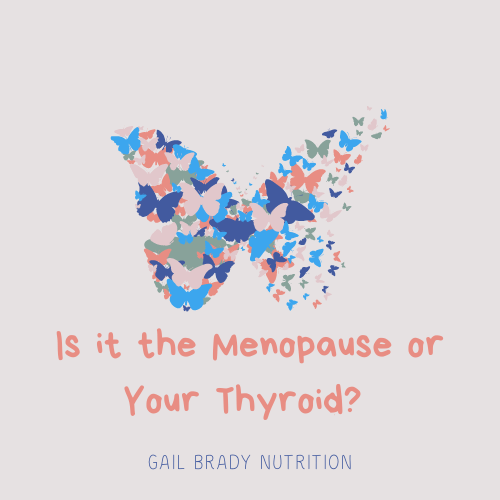The thyroid is a small butterfly-shaped gland at the front of your neck
One of its key roles is to release hormones for managing your metabolism (and your weight).
Thyroid disorders are common around the time of peri/menopause.
Currently, scientific evidence suggests that this is linked to age rather than menopause itself. However, there are limited studies.
Scientific research has found that with ageing there is a reduction in the uptake of iodine needed for optimal thyroid function, as well as a decline in the conversion of form non-active to active thyroid hormone.
However, oestrogen has been shown to increase levels of thyroid-binding globulin (TBG). TBG is a protein that carries thyroid hormones around the body. As oestrogens fall in perimenopause there is less TBG to transport thyroid hormones.
Women are 8-9 times more likely to experience thyroid issues than men, and this risk increases with age.
An underactive thyroid (hypothyroid) is the most common type of thyroid issue.
The symptoms of an underactive thyroid can mimic those of menopause.
And if your thyroid is not functioning optimally, this can make menopausal symptoms worse.
Health risks
The risk of heart disease and osteoporosis is further increased with both menopause and thyroid disorders.
Left untreated, thyroid issues could exacerbate these conditions.
This is one of the reasons that it can be so important to run a full thyroid panel in women over 40. And especially if you are struggling with perimenopausal symptoms such as brain fog, weight gain, difficulty losing weight, constipation, depression, anxiety, hair and skin issues, fatigue, menstrual irregularities and mood swings.
GP testing often only includes TSH. Unfortunately on its own, this does not tell you your active levels of thyroid hormone or give clues as to why this could be happening…
If thyroid antibodies are present this can indicate an immune response. Eventually, this can lead to autoimmune thyroid conditions, the most common being Hashimoto’s thyroiditis (an underactive thyroid). Grave’s disease, an overactive thyroid, is much less common)
A thyroid issue can affect almost every cell in your body.
It can affect your heart rate, your circulation, your energy, your body temperature, your gut and your metabolism (weight gain…)
If you would like to get your thyroid and your hormones checked, click on the link below to book a free 30-minute call
https://p.bttr.to/3x8FZMH




